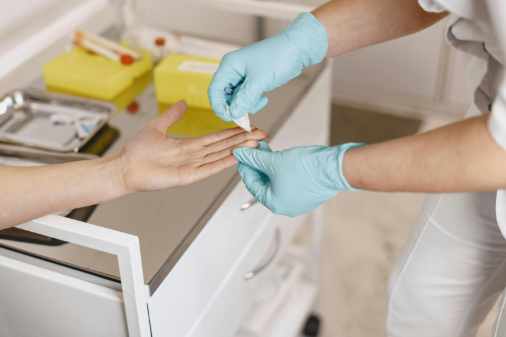Why Is It Important to Get Back-To-School Physicals and Vaccines?
Why Is It Important to Get Back-To-School Physicals and Vaccines?

As summer winds down and kids prepare to head back to school, parents need to make sure they're ready not just with school supplies but also with important health preparations. Back-to-school annual physicals and immunizations are crucial for ensuring the health and well-being of children as they return to the classroom, no matter what grade they are about to begin.
In this article, we will explore the importance of these health measures and what parents need to know to get their children ready for school. We'll look at the types of immunizations that are typically required for school-age children and why they're necessary. We'll also discuss the benefits of annual physical exams and what parents can expect during these appointments.
By staying up-to-date on these important health measures, parents can help protect their children from illnesses, give them the most recent recommended vaccinations, and ensure that they are healthy and ready to learn.
How to Get the Most Out of Your Kid’s Back-to-School Physical
The best way to maximize a child’s physical appointment is to prepare a plan beforehand. Updating your child's medical information before their annual physical exam is crucial for ensuring that their healthcare providers have a complete and accurate understanding of their health status.
Even if nothing has visibly changed with your children, accurate and up-to-date medical information helps healthcare providers make informed decisions regarding the children's healthcare needs.
The
American Academy of Pediatrics recommends completing your child's health history form before your annual wellness exam.
When updating your child's medical information, there are several key factors to consider:
- Update emergency contact information.
- Give detailed information about any existing medical conditions, including chronic illnesses, allergies, or medications.
- Provide the children’s vaccination history, including the dates and types of vaccines they have received.
- Inform of any recent injuries.
Another important task to complete before attending the medical appointment is to draft a battery of questions.
What to Expect During These Appointments?
Physicals are not just about checking a child's height and weight; they are also an opportunity for physicians to evaluate a child’s development.
During a physical exam, physicians can discuss their nutrition, sleep habits, and developmental changes to ensure that they are growing and thriving as they should be. Even if everything seems fine, the conversation with the physician can bring up important points that may have been overlooked or forgotten.
Some of the standard assessments may include:
- Collect basic information, such as height and weight measurements.
- Check vitals and blood pressure.
- Revise muscle strength, balance, and reflexes.
- Spot any abnormalities in the ears, eyes, nose, throat, and skin.
- Listen through a stethoscope to the heart and lungs.
- Check out the back for scoliosis—an abnormal curvature of the spine.
- Look for signs of puberty and development.
The Importance of a Sports Physical
Even if a child doesn’t participate in any sports, it’s important to schedule a sports physical. The truth is that all children are potential athletes, according to new guidance from six important medical organizations.
The annual check-up and the sports physical have two different purposes. As described earlier in this blog, a back-to-school physical is, in a broad sense, a head-to-toe check-up. Meanwhile, the sports physical assesses the child’s capability to participate in certain sports.
Not only can a sports physical help identify any potential health issues that could affect a child's ability to participate in sports, but it can also help prevent injuries.
Ensuring that your child is healthy, up-to-date on immunizations, and cleared to participate in school sports are vital steps to take as we approach the back-to-school season. By scheduling a physical exam for your child, you are taking a proactive approach to their health and well-being.
5 Benefits of Annual Physicals
Back-to-school physicals are an important part of ensuring that children are healthy and growing to their full potential. It’s also the perfect moment for the parents to express their questions and concerns to the pediatrician.
Some of the benefits may include:
Early Detection of Potential Health Issues
Regular physical exams can help detect potential health issues early on and prevent them from developing into more serious conditions.
Updated Vaccination Records
One of the main concerns among parents is staying up to date with their children's vaccinations. During a physical exam, healthcare providers can review a child's immunization records and ensure that they are up-to-date on all recommended vaccines.
Promoting Healthy Habits
Physical exams can provide an opportunity to discuss healthy habits such as nutrition, exercise, and sleep habits with children and their parents.
Supporting Academic Success
A child who is healthy and well-nourished is more likely to succeed academically and be willing to participate in school activities.
Addressing Mental Health Concerns
Physical exams can also be an opportunity to discuss any mental health concerns and provide support and resources for children who may be struggling.
Types of Immunizations Required
The beginning of the school year is the perfect time for a variety of checkups, along with ensuring that the vaccinations are up-to-date.
Immunizations are crucial for protecting children from potentially harmful diseases. States such as Louisiana have state-wide programs that
provide vaccines at no cost to eligible children and youth.
There are several vaccinations that are required for children. The difference between immunization requirements and recommendations can be confusing. It’s useful for parents to understand these definitions, per Louisiana’s Immunization Guide for Schools:
- Requirements: Students are required by state law to get certain vaccines to enter and attend school.
- Recommendations: The Louisiana Department of Health Office of Public Health provides a timetable with recommended immunizations by age gap.
The state sets vaccination requirements for children based on their age, and a child's immunization status is considered out of compliance if they have not received all of the required vaccines. On the contrary, if a child has received all of the vaccines required for their age group, their immunization status is considered complete.
In general, the Centers for Disease Control and Prevention provide a
table with the recommended vaccinations a child has to get from ages 0–18, which may include:
- Hepatitis A, B
- Rotavirus
- DTaP
- Dengue
- Polio
- Measles, mumps, and rubella
- Varicella
- Meningitis
- Influenza
- Covid-19
It is important to talk with your child’s primary care provider about Covid-19 vaccinations during a back-to-school physical. The school may need this information before the start of the new school year.
Additionally, it's also important to consult with a child's healthcare provider to ensure that all required and recommended vaccinations are up-to-date, as these may vary from state to state.
Now that you know the importance of back-to-school physicals, it's time to schedule an appointment for your child at Bayou Bend Health System. Our experienced and dedicated physicians and pediatric professionals in Louisiana are dedicated to providing the highest level of care to your children and family. Don't wait until the last minute.
Contact us today to schedule your children’s medical appointment and experience the difference that Bayou Bend Health System can make in your family's healthcare journey.



